Are you considering a move to the beautiful country of Ecuador?
Our comprehensive guide provides all the essential information you need, from understanding the cost of living to exploring the rich culture and assessing healthcare quality.
It's a resource tailored specifically for expats pondering the potential move.
Let's delve into what you can expect from life in Ecuador.
Secure Peace of Mind with Best-Value International Health Coverage
International Citizens Insurance provide free, no-obligation quotes from the leading international health insurance providers with plans tailored to meet your needs. Trusted by thousands of expats worldwide.
In this guide:
- Ecuador's highlights: why it is a great place for expats.
- The legalities of moving to Ecuador: visas and residency options.
- The cost of living: monthly expenses, rentals, and real estate.
- Ecuador as a retirement destination.
- Infrastructure: travel connections, public transport, internet.
- Healthcare and education.
- Working and starting business.
- Where to live in Ecuador – an overview of the most popular expat locations.
- Culture and customs.
Why Ecuador is a great place to live for expats
From its bustling cities to its peaceful beach towns, Ecuador offers a lifestyle to suit a wide range of preferences and budgets.
The natural beauty
Ecuador is blessed with a remarkable range of natural habitats, from the Andes Mountains to the Amazon rainforest.
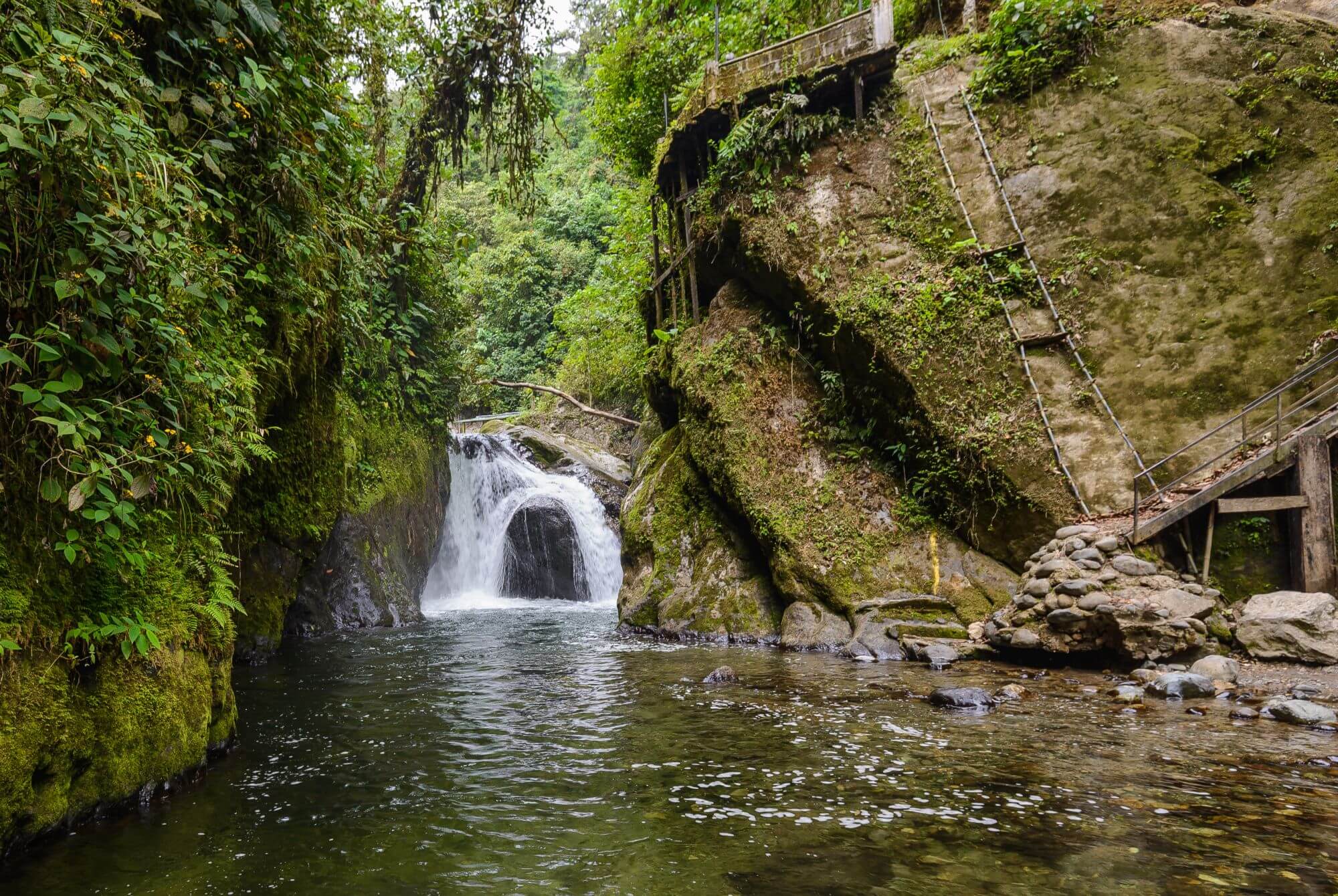
From the Pacific Coast to the Galapagos Islands, you'll be amazed by the sheer diversity of the landscapes.
The cost of living
Living in Ecuador can be surprisingly affordable. From housing and utilities to healthcare and dining out, you'll find your dollar stretches significantly further here.
You can live comfortably in Ecuador for much less than in many U.S. cities.
Life in Ecuador offers rich cultural experiences, tantalising cuisine and breathtaking natural beauty, all at an affordable cost.
The culture and people
Ecuadorians are known for their warm hospitality, and the country has a rich cultural heritage.
With an array of festivals and celebrations throughout the year, there's always something happening to make your Ecuadorian experience all the more vibrant.
The climate
With its location right on the equator, Ecuador enjoys a pleasant year-round climate.
Whether you prefer the crisp, cool air of the highlands or the mild, tropical climate of the coastal regions, there's a perfect spot for you in Ecuador.
Let's delve deeper into some key facts that every potential expat should know about living in Ecuador.
Visas and residency options
For US, UK, Canadian, and some other citizens, the application process for Ecuadorian visas is relatively straightforward.
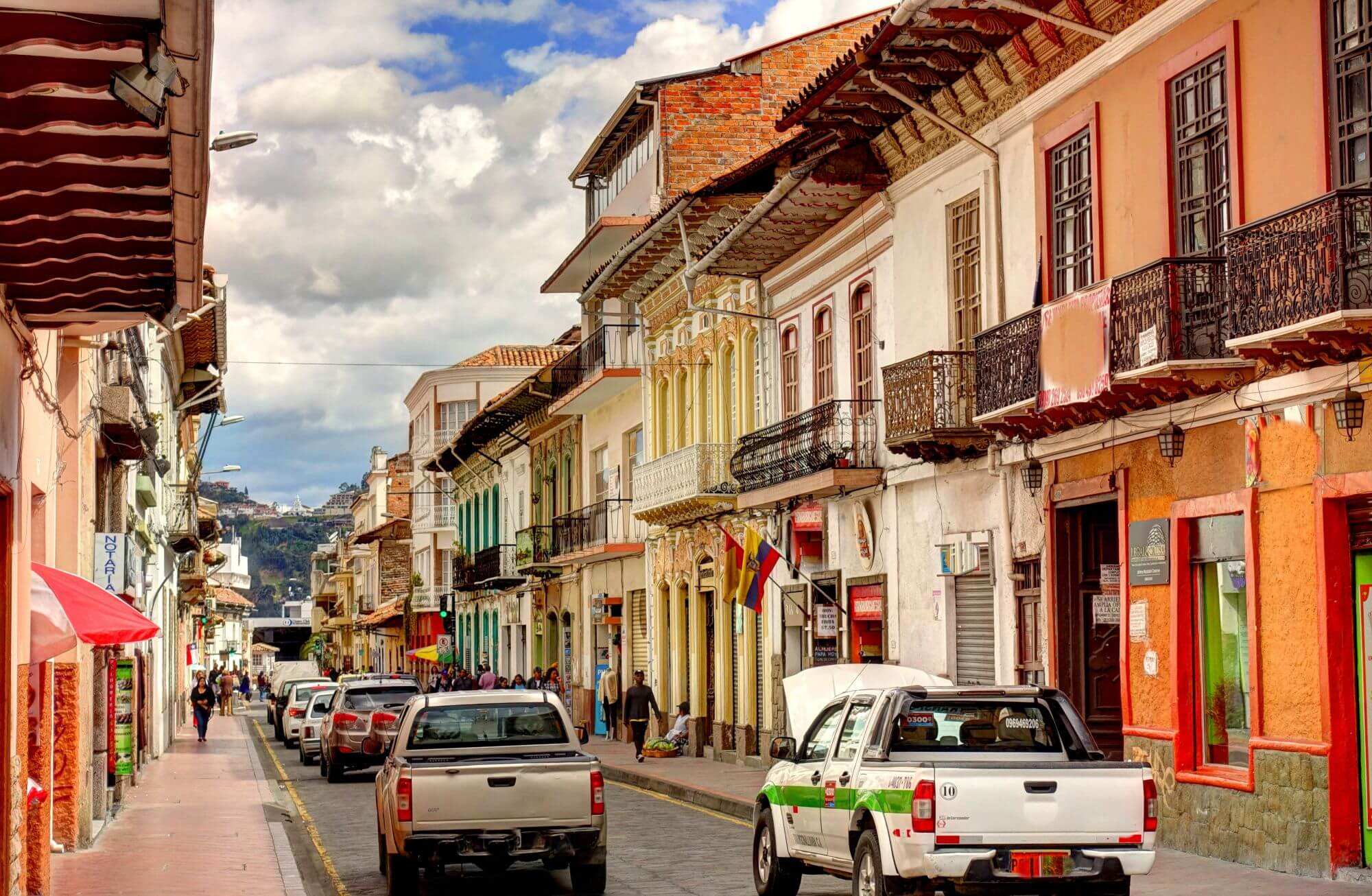
You'll need to apply for a Temporary Resident Visa (TRV) if you're planning on staying for more than 90 days.
This visa is valid for up to two years and can be renewed.
Here's what you need to know:
- Application process: You must apply at an Ecuadorian consulate in your home country. The process typically takes between two to three months.
- Required documents: You'll need to provide a valid passport, a completed application form, and proof of health insurance, among other documents such as proof of financial status.
- Fee: The application fee is approximately $50, with an additional $400 for the visa itself.
- Translation services: If you're not fluent in Spanish, expect to pay around $150 for translation services.
There are several types of these visas. See the table below for more details:
| Visa type | Requirements |
|---|---|
| Investor's Visa | Proof of a minimum investment of $45,000 in an Ecuadorian bank or real estate. |
| Digital Nomad Visa | Provide services outside of Ecuador must have earned a minimum of USD 1,275 per month in the last three months or a total of USD 15,300 over the past year. |
| Retirement Visa | Must be at least 65 years old with a minimum $800 monthly pension plus $100 for each additional dependent. |
| Professional's Visa | A degree from a recognized university and a job offer or contract from an Ecuadorian company. |
Remember, regular renewal of your visa is essential to maintain your legal status in Ecuador.
Once you've lived in Ecuador for 21 months on a Temporary Resident Visa, you can apply for a Permanent Resident Visa.
The cost of living in Ecuador
If you're wondering how far your dollar will stretch in Ecuador, you're in for a pleasant surprise. The cost of living in Ecuador is significantly lower than in the United States and Northern Europe.
Here's how Ecuador compares to some Northern European and North American countries:
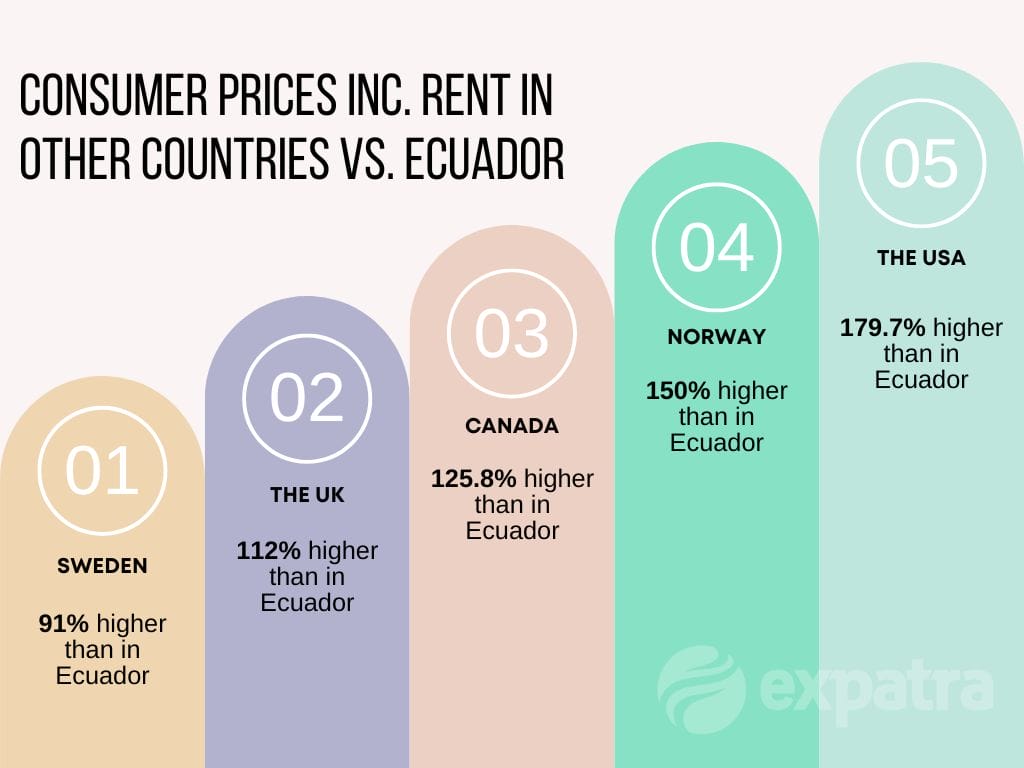
From groceries to property prices, everything is much more wallet-friendly.
Let's take a closer look at the specifics.
Housing costs
In Ecuador, renting a one-bedroom apartment in the city center costs around $350-$650 per month, while in the outskirts, it would cost about $200-$450.
If you're considering buying property, the price per square meter ranges from $850-$2,000 in the city center and $700-$1600 in the suburbs.
Grocery costs
Food costs also follow the same affordability pattern. A loaf of bread is about $1.60, a dozen eggs are around $1.90, and a liter of milk costs approximately $1.10. Dining out is affordable, too, with a meal at an inexpensive restaurant priced at around $3.50-$6.50.
Transportation costs
Public transportation is incredibly cheap, with a one-way ticket costing around $0.35 and a monthly pass at about $20.
Gasoline prices are around $0.70 per liter.
Cost comparison table
| Cost Category | Ecuador | United States |
|---|---|---|
| One-bedroom apartment rent (city center) | $350-$650 | $1,200-$3,800 |
| Grocery costs (monthly, one person) | $220-$350 | $350-$500 |
| Public transportation (monthly pass) | $20 | $60-$120 |
In summary, your dollar will indeed stretch further in Ecuador, offering you a comfortable lifestyle at a lower cost than in the US.
Retirement: why Ecuador is a popular destination for retirees
Ecuador is incredibly affordable, the climate is pleasant all year round, and the natural beauty of beaches, mountains, and rainforests create a perfect backdrop for a fulfilling retirement.
The country has become a popular retirement destination for many, especially US citizens.
According to the Expatra Global Retirement Index, Ecuador is one of the top 30 retirement destinations in the world.
The index is based on the Expatra Global Retirement Survey that asks international retirees to rate their retirement destination’s infrastructure, climate, ease of settling down, value for money, friendliness, and other aspects of life in their retirement destination.
Here's how Ecuador scores:
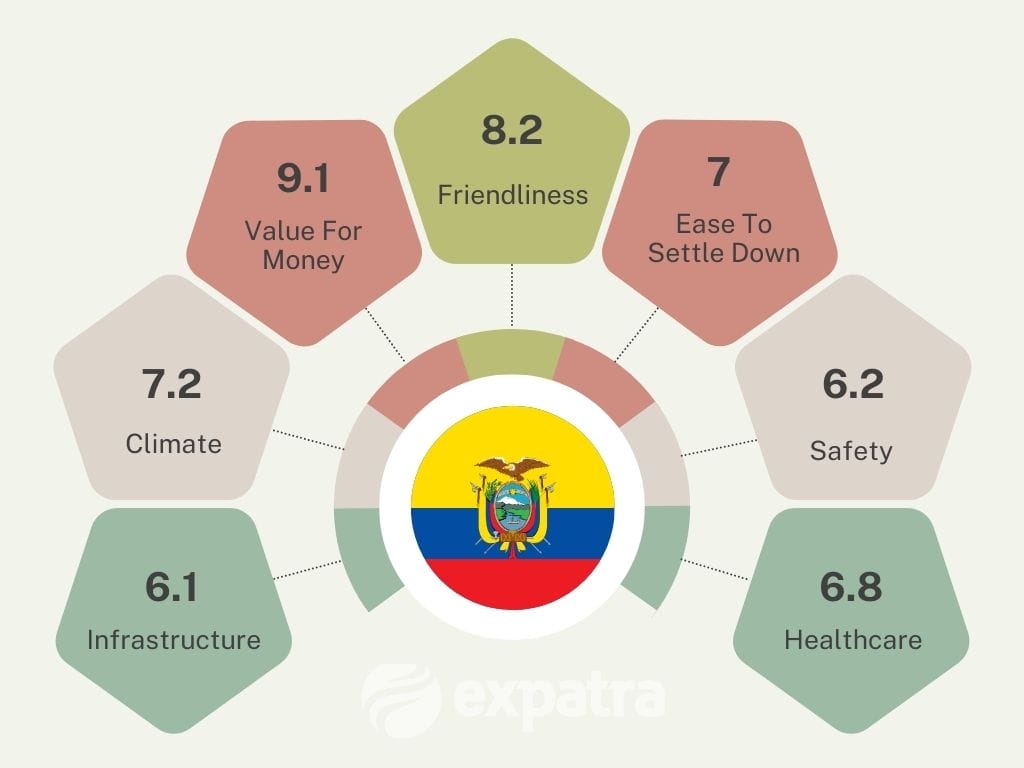
Let's look at why Ecuador is so popular for retirement:
- Pensions go further: This is a significant factor for many retirees. You can live comfortably on a pension income of around $1,600 to $2,000 per month, including rent, utilities, groceries, healthcare, and more.
- Quality healthcare for less: Ecuador offers good-quality healthcare at a fraction of U.S. prices. Many doctors in Ecuador are trained in the U.S. or Europe and speak English.
- Climate choice: Depending on where you live in Ecuador, you can choose from a variety of climates. There is the warm coastal region, the cool Andean highlands, or the more temperate climate of the valleys in between.
- Zero income tax: foreign residents are only taxed on Ecuadorian-sourced income, which means your pensions are not taxed in Ecuador.
In short, there are some very good reasons why Ecuador is a magnet for retirees.
Geography and climate: getting to know Ecuador
Snuggled between Colombia and Peru on South America's west coast, Ecuador is a country of geographical contrasts.
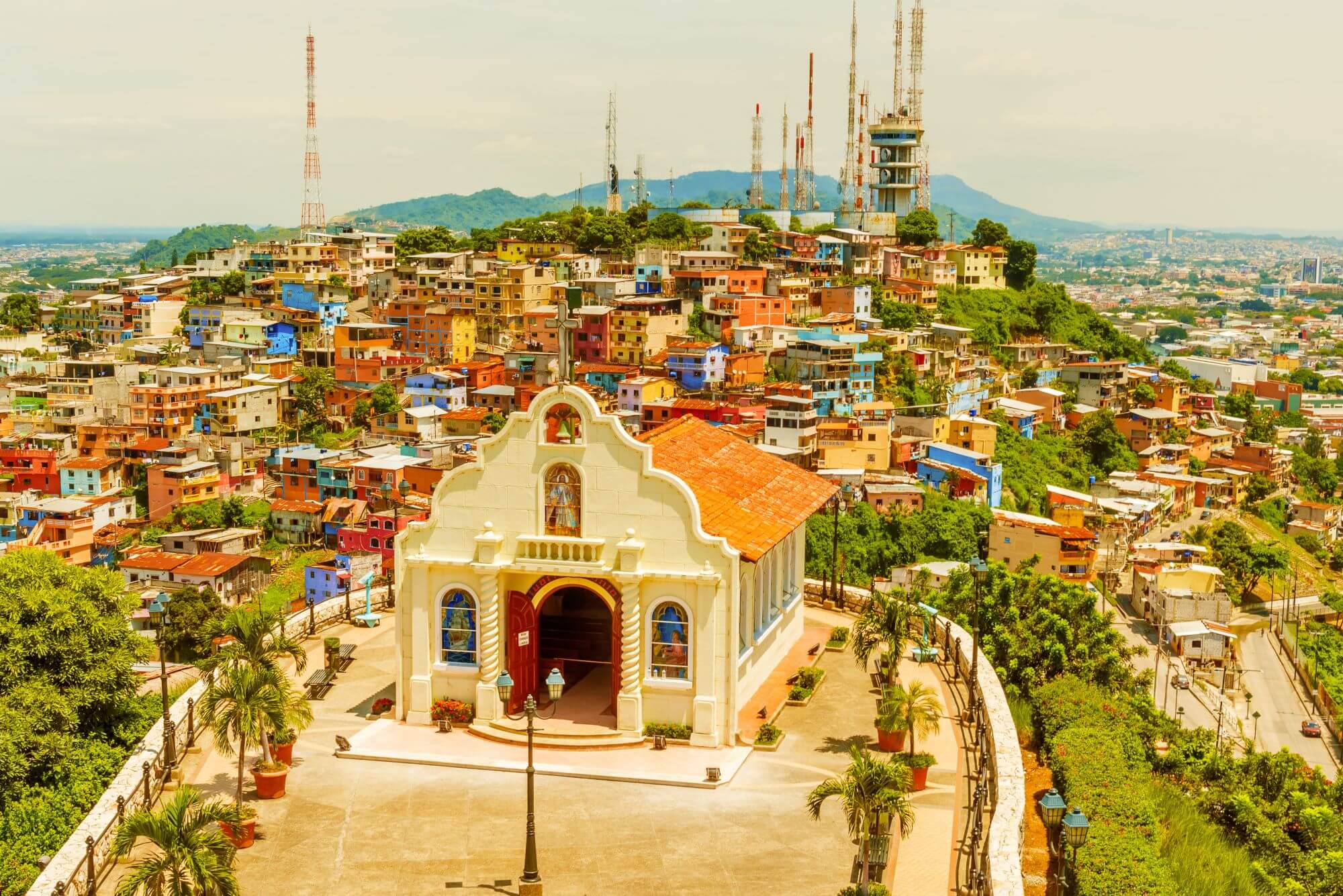
From the lush Amazon rainforest to the towering Andes mountains and the beautiful Pacific coastline to the mesmerizing Galapagos Islands, Ecuador offers many natural wonders.
Elevation plays a crucial role in Ecuador's climate, dividing the country into four main regions:
- La Costa (Coastal Lowlands)
- La Sierra (Andean Highlands)
- El Oriente (Amazon Rainforest)
- La Region Insular (Galapagos Islands)
Each region exhibits unique climatic conditions, making Ecuador an enthralling destination for expats year-round.
Despite its compact size, Ecuador is one of only 17 'megadiverse' countries in the world, thanks to its geographical diversity.
The following table breaks down the average annual temperatures and rainfall for each region:
| Region | Average Temperature (°F) | Average Rainfall (inches) |
|---|---|---|
| La Costa | 75-85 (21-30C) | 50-160 |
| La Sierra | 55-70 (13-21C) | 20-40 |
| El Oriente | 70-80 (21-27C) | 80-120 |
| La Region Insular (Galapagos) | 70-80 (21-27C) | 10-40 |
Ecuador's proximity to the equator means that the sun rises and sets at around the same time each day, giving a consistent 12-hour daytime throughout the year.
Transportation: getting around Ecuador with ease
Ecuador has a robust public transportation system that ensures you can explore the country with ease.
Air travel
Ecuador's air travel network is serviced by a number of domestic and international airlines, with the main airports located in Quito and Guayaquil.
Mariscal Sucre International Airport (UIO)
- Location: Quito
- Domestic destinations: Guayaquil, Cuenca, Manta, Baltra (Galapagos Islands), Coca, Loja, Esmeraldas, San Cristobal (Galapagos Islands), Santa Rosa, Lago Agrio.
- International destinations: Bogota, Lima, Panama City, Mexico City, Miami, Madrid, Fort Lauderdale, Houston, Amsterdam, New York (JFK), Sao Paulo, Buenos Aires, Santiago, Cali, San Salvador, Madrid, Caracas, Punta Cana, and others.
Jose Joaquin de Olmedo International Airport (GYE)
- Location: Guayaquil
- Domestic destinations: Quito, Cuenca, Baltra (Galapagos Islands), Loja, Manta, Santa Rosa, Lago Agrio, Coca, Esmeraldas.
- International destinations: Bogota, Lima, Panama City, New York (JFK), Miami, Madrid, Fort Lauderdale, Houston, Amsterdam, Mexico City, San Salvador, Buenos Aires, Santiago, Punta Cana, Caracas, and others.
Mariscal Lamar International Airport (CUE)
- Location: Cuenca
- Domestic destinations: Quito, Guayaquil.
Eloy Alfaro International Airport (MEC)
- Location: Manta
- Domestic destinations: Quito, Guayaquil, Baltra (Galapagos Islands).
- International destinations: Miami.
Seymour Airport (GPS)
- Location: Baltra (Galapagos Islands)
- Domestic destinations: Quito, Guayaquil, San Cristobal (Galapagos Islands).
Trains
Train travel in Ecuador is more about the journey than the destination.
The country's rail network isn't extensive but offers some of the most scenic rides in South America, such as the thrilling ride from Quito to Nariz del Diablo (Devil's Nose).
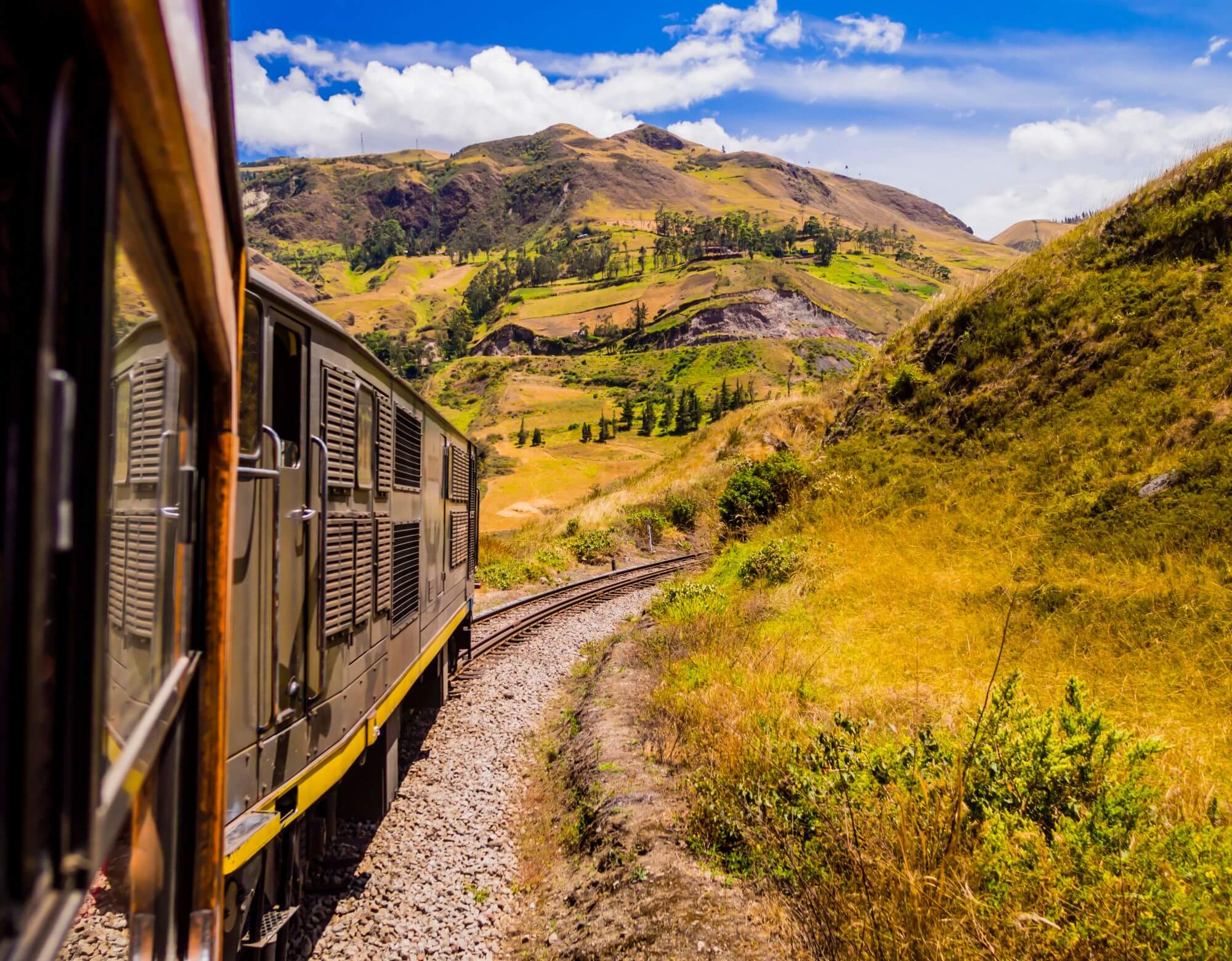
Buses
Buses are the most common mode of public transportation in Ecuador. They are frequent, inexpensive, and service almost every town and city in the country.
Metro
The first and only metro line in Ecuador is located in Quito, and it opened in 2019. This efficient mode of transport aims to reduce traffic congestion in the city and offers a clean and quick alternative to bus travel.
Taxis
Taxis are plentiful and reasonably priced in Ecuador. Drivers usually don't use meters, so it's advisable to agree on a fare before starting your journey.
Official taxis are yellow and display a unique number, which adds an extra layer of safety for passengers.
Remember, while public transportation in Ecuador is generally reliable and efficient, it's always good to plan your journeys in advance and stay aware of your surroundings.
Internet and mobile connectivity
The country has a good cellular connection, and in major cities, you will have access to WIFI and fiber optic technology. However, the internet connection is not as reliable in all parts of the country. Plus, electricity outages are common, so having some sort of backup is highly advisable.
Major providers, such as Claro, Movistar, and CNT, offer both mobile and fixed broadband networks. They have pay-as-you-go plans and monthly plans that include data and speed limits. Movistar also offers an unlimited plan.
Housing: finding your dream home in Ecuador
When planning your move to Ecuador, one of the first things you'll likely consider is housing.
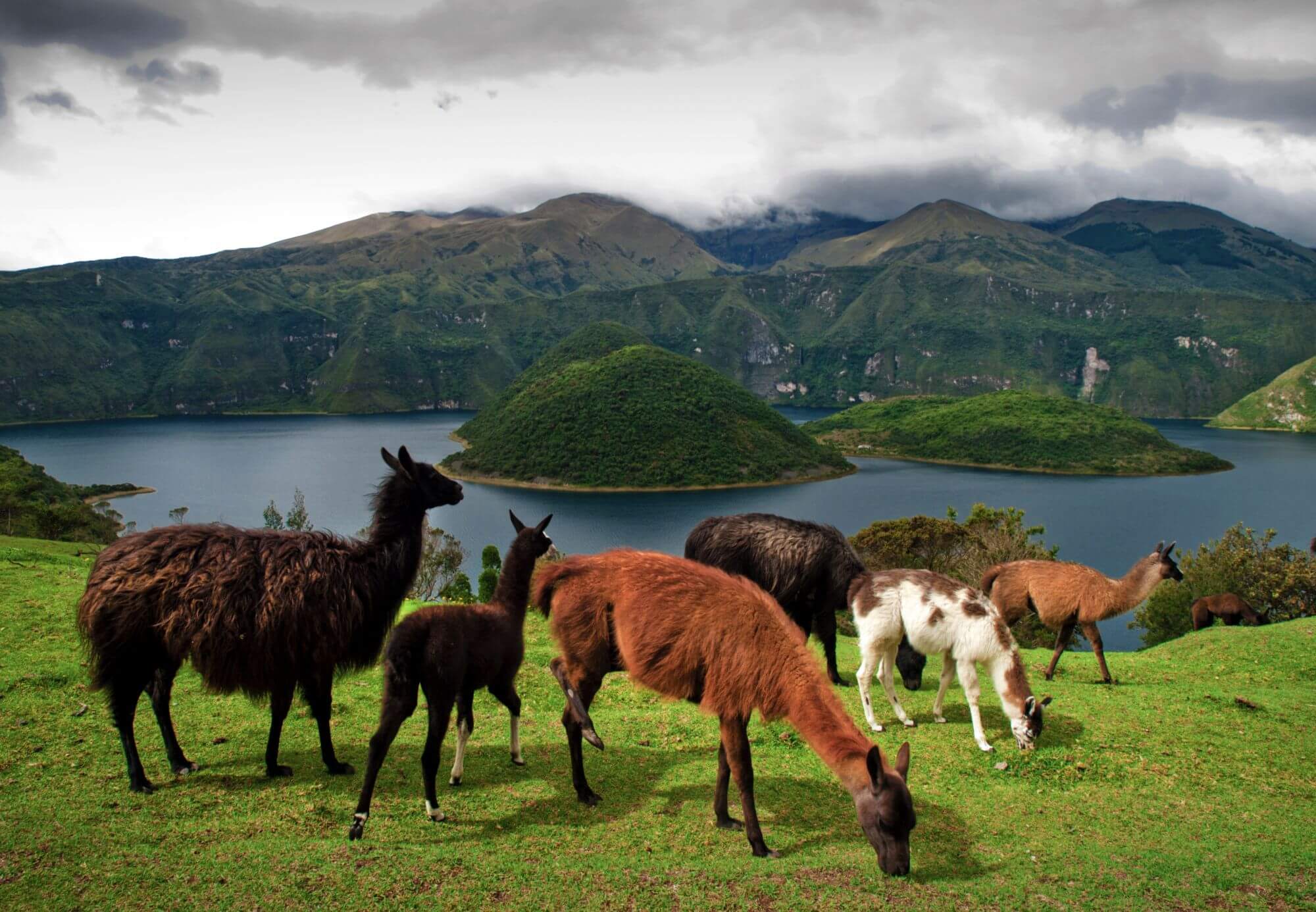
Ecuador provides a variety of options for every budget, from economical apartments to luxurious villas.
Whether you're keen on buying a property or just renting, you'll find a wide array of options at your disposal.
Renting in Ecuador
The process of renting a property in Ecuador is reasonably straightforward.
You'll find a broad range of comfortable apartments, houses, and villas available for rent in various parts of the country.
The cost of rent varies based on the location and the type of accommodation.
Generally, a comfortable one-bedroom apartment in the city center starts at around $350 per month, while a luxury apartment with ocean views will cost around $1200 monthly.
Note: Always read through the lease agreement thoroughly before signing, and don't hesitate to negotiate the terms. English contracts are not uncommon for expats, so don't be afraid to ask.
Buying property in Ecuador
If you're considering making a long-term commitment, buying property in Ecuador might be an excellent choice.
Foreigners have the same property rights as locals. However, it's crucial to hire a reliable, English-speaking attorney to guide you through the process.
| City | Average price per square meter |
|---|---|
| Quito | $1050 - $2,100 |
| Guayaquil | $850 - $1,500 |
| Cuenca | $900 - $1,600 |
As shown in the table, Quito, the capital, tends to have the highest property prices.
However, more affordable options can be found in other parts of the country, such as Cuenca or the smaller coastal towns.
Before purchasing a property, it's advisable to rent for a while to get a good feel for the area and understand whether it suits your lifestyle.
Healthcare in Ecuador
Ecuador's healthcare system operates on a public and private basis.
The public system, known as Instituto Ecuatoriano de Seguridad Social (IESS), offers free or low-cost healthcare services to its contributors. However, it's worth noting that:
- Wait times can be long, with priority given to emergency cases.
- Some specialized treatments might not be available.
- Hospitals and clinics are often crowded, particularly in urban areas.
On the other hand, the private healthcare system offers a higher standard of care, with a wider range of treatments and shorter waiting times. However, these benefits come at a higher cost.
As an expat, it's often recommended to have private health insurance to ensure access to the best healthcare facilities.
International health insurance is also a popular option for expats.
To ensure you get the best value for money, compare international health insurance options from various providers to find the best deal.
Here is a quick comparison between healthcare in Ecuador and the US:
| Aspect | Ecuador | USA |
|---|---|---|
| Cost of healthcare | Lower | Higher |
| Quality of public healthcare | Average | High |
| Access to specialist treatments | Limited in public hospitals | Widely available |
| Health insurance | Recommended for expats | Almost essential |
It's also important to remember that while many doctors and healthcare professionals in Ecuador speak English, especially in larger cities, there may be a language barrier in more rural areas.
Education and schools
The Ecuadorian education system has taken significant strides forward in recent years, offering diverse learning opportunities for both expats and locals alike.
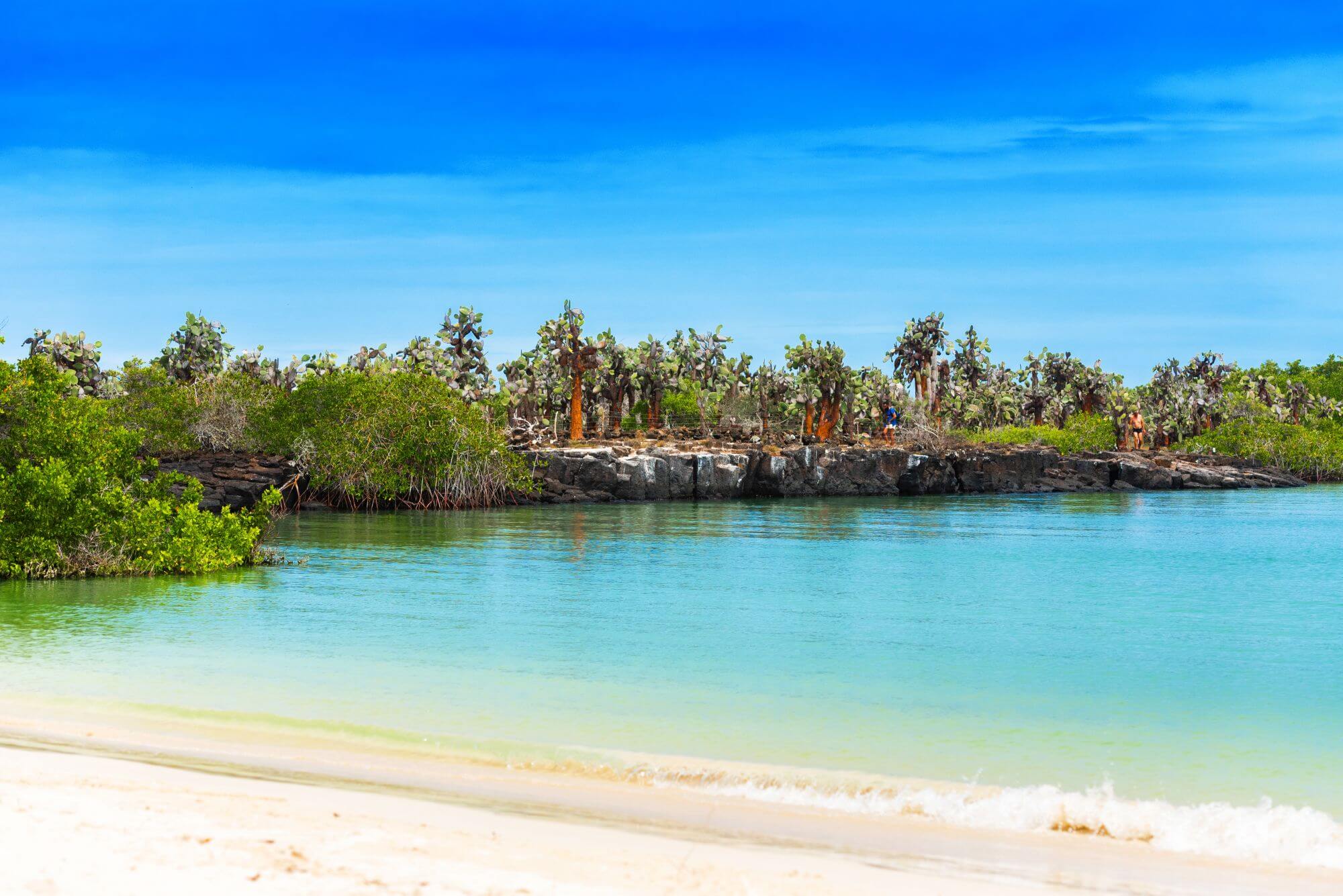
Public and private schools
Ecuador offers a mix of public and private schools, all regulated by the Ministry of Education.
The language of instruction in public schools is predominantly Spanish, while private schools, particularly international schools, often offer bilingual curriculums in English and Spanish.
Public schools: Though free, these schools might pose language barriers for non-Spanish-speaking kids. However, they offer an excellent opportunity for cultural immersion.
Private schools: These institutions charge tuition and often provide more resources and smaller class sizes.
Many expats choose private schools for their children due to their bilingual programs and international accreditations.
International schools
There are numerous international schools in the major cities of Ecuador.
These schools usually follow the International Baccalaureate curriculum and have a strong reputation for quality education.
Here are some of the most popuar international schools:
| International School | Location | Curriculum | Approximate Fees (per year) |
|---|---|---|---|
| Colegio Menor | Quito and Samborondón | International Baccalaureate (IB) | $12,000 - $18,000 |
| Alliance Academy International | Quito | American curriculum | $10,000 - $15,000 |
| British School Quito | Quito | British National Curriculum | $8,000 - $12,000 |
| Inter-American Academy of Guayaquil | Guayaquil | International Baccalaureate (IB) | $12,000 - $16,000 |
| Academia Cotopaxi | Quito | International Baccalaureate (IB) | $14,000 - $20,000 |
| Newton International School | Cumbayá, Quito | British National Curriculum | $10,000 - $15,000 |
| Lycée La Condamine | Quito | French Curriculum | $8,000 - $12,000 |
| Colegio Alemán Quito | Quito | German curriculum | $8,000 - $12,000 |
| Colegio Americano de Quito | Quito | American curriculum | $10,000 - $15,000 |
Homeschooling
If you prefer to homeschool your children, Ecuador is relatively flexible. Homeschooling is legal and growing in popularity among the expat community.
Always ensure you're following the current rules and regulations to maintain your child's education standard.
Higher education
Ecuador houses a number of reputable universities and higher education institutes. Tuition fees are relatively reasonable compared to U.S. prices.
There are public and private universities, with courses available in both Spanish and English. This can be an enticing opportunity for expats looking to further their education while living in Ecuador.
Working: employment opportunities and starting a business in Ecuador
If you've got your sights set on working in Ecuador, you'll be comforted to know that the country has a growing economy with opportunities in various sectors.
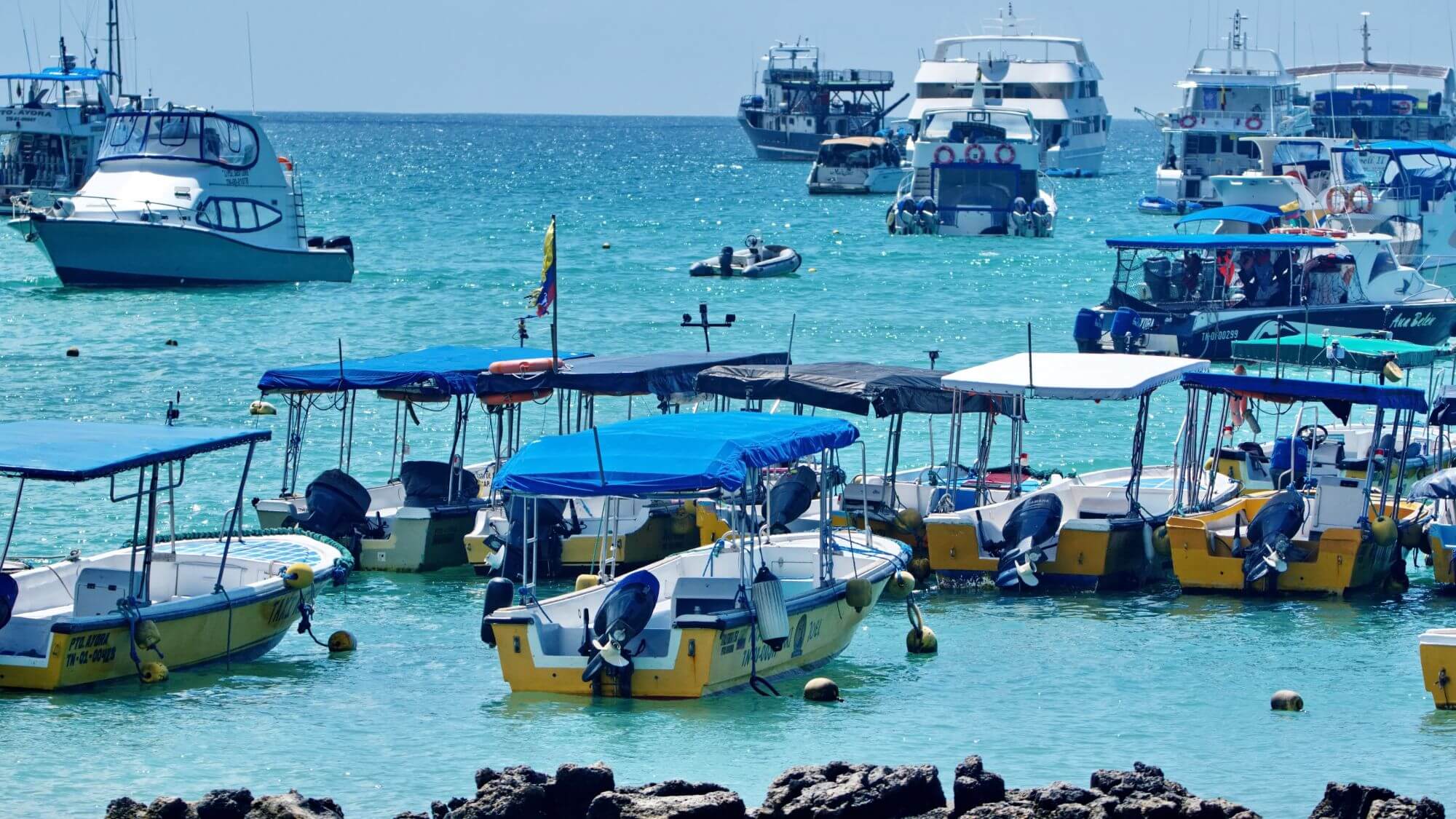
Whether you're an employee seeking a job or an entrepreneur eyeing a start-up, here's what you need to know.
Employment opportunities
Ecuador's economic landscape is diverse, offering job opportunities in areas like agriculture, oil and gas, tourism, and education.
Teaching English is a sought-after position for expats, with schools and universities always on the lookout for native English speakers.
Remember, although Spanish is not a prerequisite for all jobs, it's a significant advantage.
Starting a business
Starting a business in Ecuador can be an exciting venture.
The government has made efforts to attract foreign investment, offering incentives and simplifying the process of starting a business.
However, it's not without its challenges.
- Business culture: Understanding the local business culture is essential. Ecuadorians value personal relationships, so face-to-face meetings are often preferred.
- Legal requirements: You'll need to navigate through a series of legal requirements, including obtaining the right visa, registering your business, and understanding local tax laws.
Despite these challenges, many expats find starting a business in Ecuador rewarding. The key is to be prepared, patient, and persistent.
As an expat, forging connections with local business owners and joining expat business groups can be invaluable.
Whether you're looking to join the Ecuadorian workforce or start a business, the opportunities are plentiful, and the experience can be enriching.
Remember, the key to success is understanding the local culture, mastering the language, and being adaptable to new experiences.
Where to live in Ecuador
Ecuador is like a treasure trove of amazing places to live, with everything from the lush Amazon rainforest to the stunning Andes Mountains and lively coastal areas. No matter what your desired lifestyle and preferences are, you can find just the right locatuin for you.
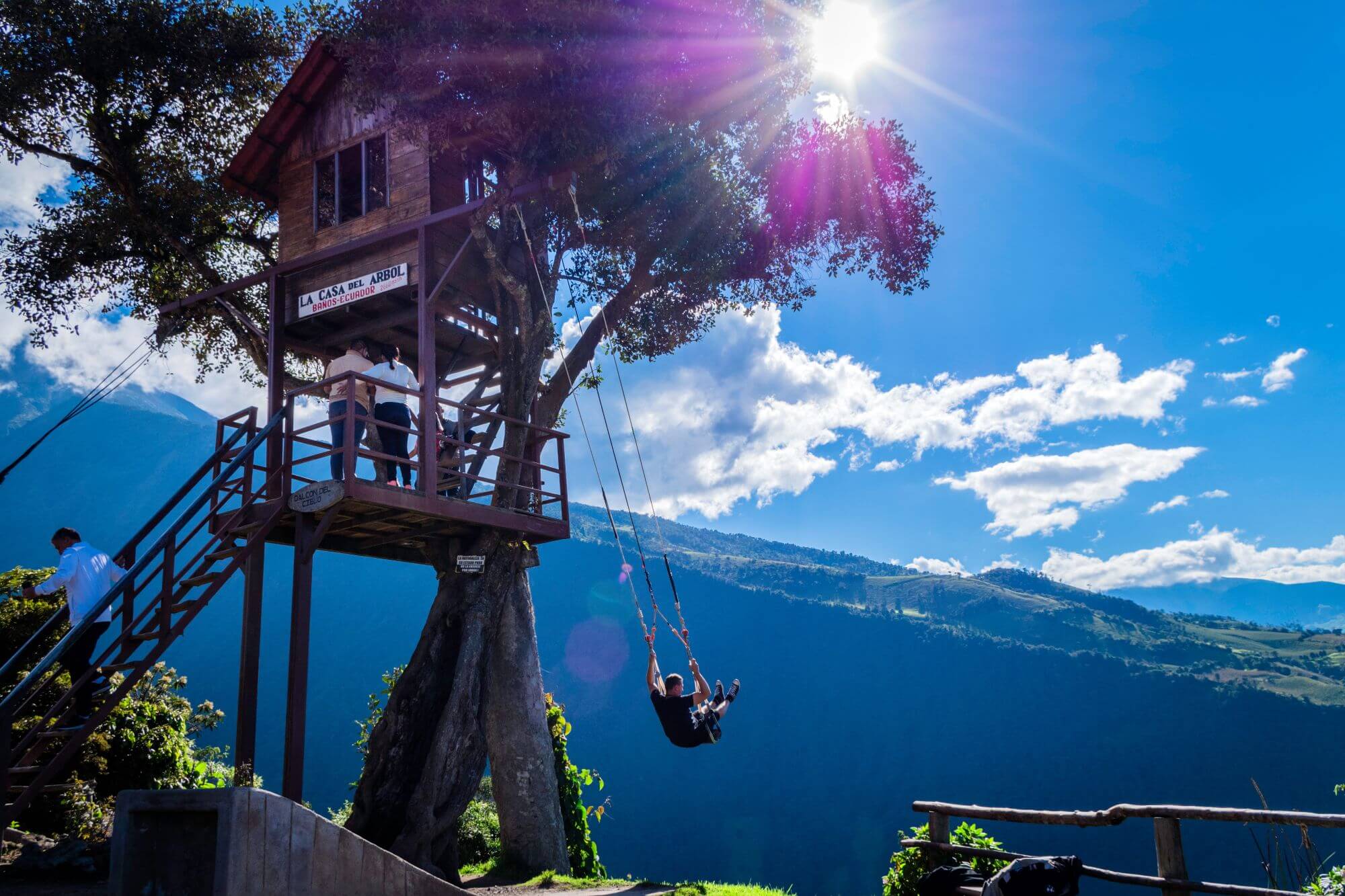
Let's talk abpiy the top 3 most popular locations for exotas:
Quito - for working and doing business
Located in the highlands of Ecuador, Quito is the capital city and a thriving hub for professionals and entrepreneurs. It offers a vibrant business environment, with ample job opportunities and a growing startup scene. Quito also has a rich cultural heritage, stunning architecture, and various entertainment options.
Cuenca - for retirees
Nestled in the Andean mountains, Cuenca is often considered one of the best retirement destinations in Ecuador. Its picturesque colonial architecture, tranquil ambiance, and pleasant climate make it a popular choice for retirees. Cuenca also boasts a low cost of living, excellent healthcare facilities, and a well-established expat community.
Guayaquil - a great all-rounder
Situated on the Pacific coast, Guayaquil is Ecuador's largest city. It offers a diverse range of opportunities for expats, including a booming economy, fun nightlife, and rich cultural heritage.
Here is a short overview of the most popular locations for expats:
| Place | Location | Average property price | Climate |
|---|---|---|---|
| Quito | Pichincha Province | $150,000 | Quito has a pleasant mild temperate climate with cool summers and mild winters. |
| Cuenca | Azuay Province | $130,000 | Cuenca enjoys a mild temperate climate with warm summers and mild winters. |
| Loja | Loja Province | $120,000 | Loja features a pleasant sub-tropical climate with hot summers and mild winters. |
| Vilcabamba | Loja Province | $140,000 | Vilcabamba offers a delightful sub-tropical climate with warm summers and mild winters. |
| Salinas | Santa Elena Province | $180,000 | Salinas boasts a coastal climate with warm summers and mild winters, accompanied by refreshing sea breezes. |
| Otavalo | Imbabura Province | $100,000 | Otavalo experiences a mild temperate climate with pleasant summers and mild winters. |
| Ambato | Tungurahua Province | $110,000 | Ambato enjoys a mild temperate climate with comfortable summers and mild winters. |
| Baños | Tungurahua Province | $130,000 | Baños has a pleasant mild temperate climate with enjoyable summers and mild winters. |
| Montañita | Santa Elena Province | $160,000 | Montañita offers a coastal climate with warm summers and mild winters, along with captivating ocean views. |
| Manta | Manabí Province | $170,000 | Manta features a coastal climate with tropical warmth and sea breezes during summers, and mild winters. |
For more information, visit our guide on the best places to live in Ecuador.
Culture: embracing Ecuador's rich heritage and diverse society
Ecuadorians are known for their warm hospitality and rich cultural traditions that have been passed down through generations.
Language:
The country's official language is Spanish, but many people also speak English, especially in the major cities.
Indigenous languages like Quichua are also spoken in certain regions.
Learning some basic Spanish will not only help you navigate daily life more smoothly but also enable you to connect more meaningfully with the locals.
Customs and etiquette:
Ecuadorians value respect and politeness, which is reflected in their customs and etiquette. While Ecuadorians are generally informal, it's polite to address older people or those in authority using their titles and surnames.
When invited to an Ecuadorian home, it's customary to bring a small gift, such as flowers or sweets.
Dining etiquette is also important, with guests expected to wait until the host begins eating before they start.
Festivals and celebrations:
Ecuador is a country of festivals, with celebrations taking place throughout the year.
These events are a spirited blend of indigenous, Spanish, and modern traditions.
Notable festivals include Carnival, a pre-Lenten celebration with parades, dancing, and water fights.
Easter is commemorated with religious processions and the lively New Year’s Eve celebrations where effigies known as 'Años Viejos' are burned to say goodbye to the old year and welcome the new.
Food: savoring Ecuador's cuisine and culinary traditions
Imagine the freshest seafood caught just hours before or sinking your teeth into juicy tropical fruits that taste like sunshine.

Ecuador's cuisine is as diverse as its landscapes, with each region offering unique flavors and traditions.
The coastal cuisine
On the coast, seafood reigns supreme. The region's star dish is ceviche, a refreshing mixture of raw seafood marinated in citrus juices, typically lime, garnished with onions and cilantro, and served with crunchy toasted corn.
The Andean delights
In the Andes, the food is hearty and wholesome. One iconic dish is llapingachos, a pair of cheese-filled potato patties served with peanut sauce, avocado, and a fried egg.
The highlands also produce fantastic grains and legumes, making it the heartland of Ecuador's soul-warming soups.
The Amazonian flavors
In the Amazon, the indigenous communities have developed a rich culinary tradition centered around the bounty of the rainforest.
Here, you'll find dishes like maito, fish wrapped in a bijao leaf and cooked over an open fire, offering a beautiful smoky flavor.
Leisure: enjoying Ecuador's natural wonders and vibrant cities
Whether you're an outdoor enthusiast, a culture vulture, or someone just looking for a laid-back lifestyle, Ecuador offers you various leisure activities.
Here's a glimpse into some of the leisure opportunities that await you in this South American gem.
Unmatched outdoor adventures
From exploring the mysterious Galapagos Islands to hiking the rugged trails of the Andes, Ecuador is a playground for outdoor adventures.
The country has 11 national parks and numerous nature reserves, each flaunting a unique ecosystem.
- Cotopaxi National Park: Known for its active volcano, this park is a hiker's paradise.
- Sangay National Park: Here, you can witness the rare spectacle of glaciers meeting the Amazon rainforest.
- Machalilla National Park: This coastal park is perfect for diving, bird-watching, and whale spotting.
Immerse in rich cultural experiences
When it comes to experiencing Ecuador's rich culture, its cities are the places to be.
Quito, the capital city, is a UNESCO World Heritage Site, showcasing a blend of colonial architecture and thriving modernity.
Cuenca, another UNESCO city, is known for its art scene and beautiful historical buildings.
Relax and unwind in comfort
Living in Ecuador doesn't mean you have to forego the comfort you're used to. The country offers top-notch facilities, from world-class hospitals to upscale restaurants, ensuring a quality lifestyle.
Ecuador is a country that has masterfully blended its natural wonders with the convenience of modern amenities, making it perfect for those seeking a fulfilling and comfortable expat life.
Ecuador's security overview
Despite being a beautiful country with an incredible culture, Ecuador isn't devoid of security concerns.
However, with the right knowledge and precautions, you can navigate your way safely.
Safety in cities vs. rural areas
Living in Ecuadorian cities can be a bit of a mixed bag when it comes to safety.
Areas like Quito and Guayaquil have their fair share of crime, particularly in certain neighborhoods. However, these cities also house safer, upmarket neighborhoods that are popular with expats.
On the other hand, rural areas in Ecuador are generally safer. Crime rates are lower, and the communities are often welcoming and close-knit.
Keep in mind that more rural regions may lack certain amenities and quick access to healthcare facilities.
Common safety concerns
- Petty theft: Pickpocketing and bag snatching can happen in crowded places and on public transport.
- Violent crime: While less frequent, violent incidents can occur, especially late at night or in secluded areas.
- Road safety: Traffic rules are not always adhered to, making driving in Ecuador potentially dangerous.
- Natural hazards: Ecuador is prone to earthquakes and volcanic eruptions, so it's wise to stay informed about potential natural disasters.
Staying safe in Ecuador: tips and precautions
- Stay alert: Always be aware of your surroundings and take note of any suspicious activity.
- Travel in groups: Whenever possible, travel with others, especially at night.
- Avoid flaunting wealth: Keep expensive electronics, jewelry, and large amounts of cash out of sight.
- Take registered taxis: It's safer to use registered taxis or reputable ride-share services.
Living in Ecuador can be a rewarding and enriching experience. Don't let safety concerns deter you. Instead, equip yourself with the right knowledge and precautions to enjoy everything this beautiful country has to offer.
Conclusion: is living in Ecuador right for you?
As you ponder over the prospect of a life in Ecuador, it's essential to consider the many facets that this diverse country offers.
Your decision will depend on your personal preferences, lifestyle, and goals, but let's delve into some aspects that make Ecuador a unique and inviting choice.
- Cultural richness: Ecuador is a melting pot of indigenous, Mestizo, and European traditions, creating a vibrant cultural landscape.
- Natural beauty: From the lush Amazon rainforest to the majestic Andes Mountains and a stunning coastline, Ecuador's diverse landscapes are a nature lover's paradise.
- Cost of living: Your dollars will stretch further in Ecuador. With lower costs for housing, groceries, and healthcare, many expats find they can enjoy a higher standard of living.
However, it's crucial to note that while Ecuador has a lot to offer, it may come with certain challenges.
These may include language barriers, cultural differences, and adaptation to a slower pace of life. Moving to another country is always an adventure, rife with the excitement of the unknown.
So, is living in Ecuador right for you?
Only you can answer that question.
But by understanding the realities of life in Ecuador, you will be empowered to make an informed decision.
And who knows? It might just be the best decision you've ever made.
Other popular South American countries to consider:
- Living In Chile
- Living In Mexico
- Living In Panama
- Living In Costa Rica
- Living In Colombia
- Living In Brazil
- Living In Paraguay
You might find useful:
Helpful external links:
- Ecuador Immigration Services - the official government site
- Free immigration and residency advice - the official government site and service
- Ecuador's Hospitals
- Ecuador's Natinal Parks
- The U.S. Embassy and Consulate in Ecuador
Secure Peace of Mind with Best-Value International Health Coverage
International Citizens Insurance provide free, no-obligation quotes from the leading international health insurance providers with plans tailored to meet your needs. Trusted by thousands of expats worldwide.



